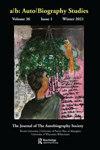克劳斯·曼:《生物小说中的音乐与转换艺术》
Q1 Arts and Humanities
引用次数: 0
摘要
克劳斯·曼在《pathacimtique交响曲》(1935)中带领读者进入著名作曲家柴可夫斯基的内心和灵魂。他让他们了解柴可夫斯基作为一个古怪的、有欧洲思想的作曲家,在十九世纪被民族思想主导的俄罗斯音乐界所经历的艰辛。利用音乐的超凡力量,曼恩通过突出主人公生活和音乐中丰富的跨国联系来对抗国家框架。因此,这部小说是对他在1933年逃离的民族主义纳粹德国的批判性回应。本文章由计算机程序翻译,如有差异,请以英文原文为准。
Klaus Mann, Music, and the Art of Transformation in Biofiction
Abstract In Symphonie Pathétique (1935) Klaus Mann takes readers into the heart and soul of the famous composer Tchaikovsky. He makes them understand the hardship Tchaikovsky endured as a queer, European-minded composer in Russia’s musical world in the nineteenth century, which is dominated by national thought. Tapping into the transcendent power of music, Mann counters the national frame by highlighting fertile transnational connections in the life and music of his protagonist. As such, the novel is a critical response to the nationalist Nazi-Germany he fled in 1933.
求助全文
通过发布文献求助,成功后即可免费获取论文全文。
去求助
来源期刊

a/b: Auto/Biography Studies
Arts and Humanities-Literature and Literary Theory
CiteScore
0.80
自引率
0.00%
发文量
27
期刊介绍:
a /b: Auto/Biography Studies enjoys an international reputation for publishing the highest level of peer-reviewed scholarship in the fields of autobiography, biography, life narrative, and identity studies. a/b draws from a diverse community of global scholars to publish essays that further the scholarly discourse on historic and contemporary auto/biographical narratives. For over thirty years, the journal has pushed ongoing conversations in the field in new directions and charted an innovative path into interdisciplinary and multimodal narrative analysis. The journal accepts submissions of scholarly essays, review essays, and book reviews of critical and theoretical texts as well as proposals for special issues and essay clusters. Submissions are subject to initial appraisal by the editors, and, if found suitable for further consideration, to independent, anonymous peer review.
 求助内容:
求助内容: 应助结果提醒方式:
应助结果提醒方式:


